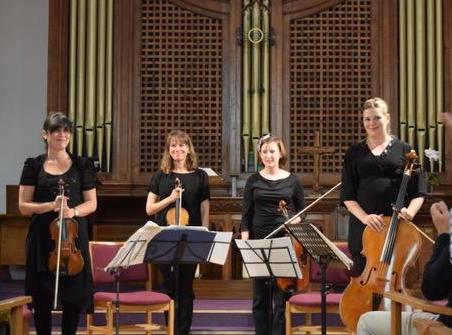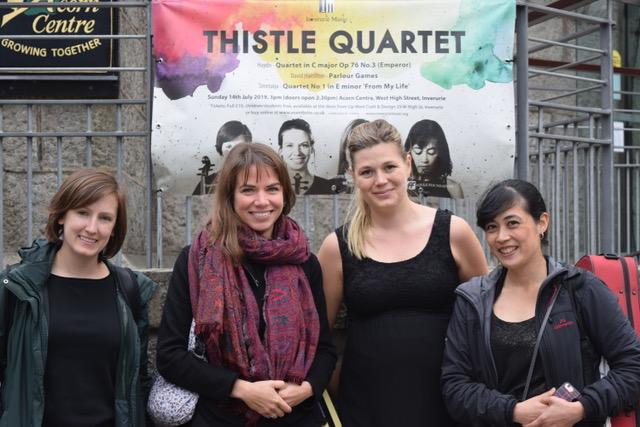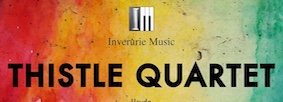
The Acorn Centre played host on Sunday afternoon to the first performance of the Thistle Quartet.
Based in Aberdeen, or more exactly Torry, they teach in the Big Noise scheme, which uses orchestral playing to reach out and empower over 500 children. It is supported by Sistema Scotland, a charity that aims to transform lives and communities through music. Beginning in South America, the idea has spread to all parts of the world, engendering a “can do” philosophy in communities that are deprived or under pressure.
The Thistles are an international group that match Sistema’s global appeal. Coralie is from New Zealand and has an eclectic approach to her music-making, mixing classical with jazz and folk and composing her own titles. Laura hails from Nova Scotia, Canada and co-founded Chamber Music Without Borders, an organisation that sends music students out to perform in churches, schools and shelters. Laurie is from North Carolina and has been active as an orchestral and chamber musician in Europe, the US and Panama. Her talents are not confined to music; as a member of Aberdeen Diving Club she won gold and silver medals at the Edinburgh Spring Masters Novice competition. Jenni is originally from Finland and specialised in Czech music and improvisation at Brno in the Czech Republic. All are committed music educators that believe in the power of music to transform and bring enjoyment at all levels.

The programme opened with the Quartet in C major Op 76 no 3 by Haydn which was performed beautifully with precision, balance and dignity. Haydn was so revered as a composer and teacher by his contemporaries that he was referred to as “Papa” Haydn. In the 2nd movement, the stately melody, ‘God Save Emperor Franz’, which was adopted by both Austrian and German Empires as their national anthem, is a masterpiece of form in the style of an arch. The opening theme, founded steadily on the lower register of the voice, is repeated. A rising cluster of rhythmic sequences lead us to bright expectation with a sudden change of key and the top is reached with the climatic top note. Haydn then leads us downward by inverting the opening three notes, imitating the rhythmic sequence with a flourish at the end. The anthem certainly conveys the idea of unity and assured completeness as well as being a rich theme for a set of variations.
The Haydn was followed by a set of ‘Parlour Games’ by David Hamilton a living composer from New Zealand. The quartet clearly enjoyed these lively pieces that were inventive and easily appreciated by the audience.
The concert again took up a nationalist flavour with the performance of Quartet no 1 in E minor (‘From My Life’). Smetana led a troubled life as a revolutionary, both politically and artistically and this introspective work reflects both his differences with Austrian rule and impatience with the musical establishment. The Thistles took up the mood of the work with energy and attentiveness to detail. Unusual prominence was given to the viola and cello parts, which gave a sombre, perhaps unfulfilled character to the work, however this was enlivened by the dance rhythms of his native country. As Jenni mentioned in her introduction, Smetana is reckoned to be the father of Czech music.
Is music really nationalistic? There are different styles, but as with our languages, they travel and mix with other styles and fuse together. An encore Breton fiddle tune by Paul Stanford demonstrated the connection with Scotland and set the toes a tapping. With such a wide repertoire, accomplishments and enthusiasm, the Thistle Quartet deserve to be placed at the top of the bill.
A. Massey
16th July 2019




Comments: no replies